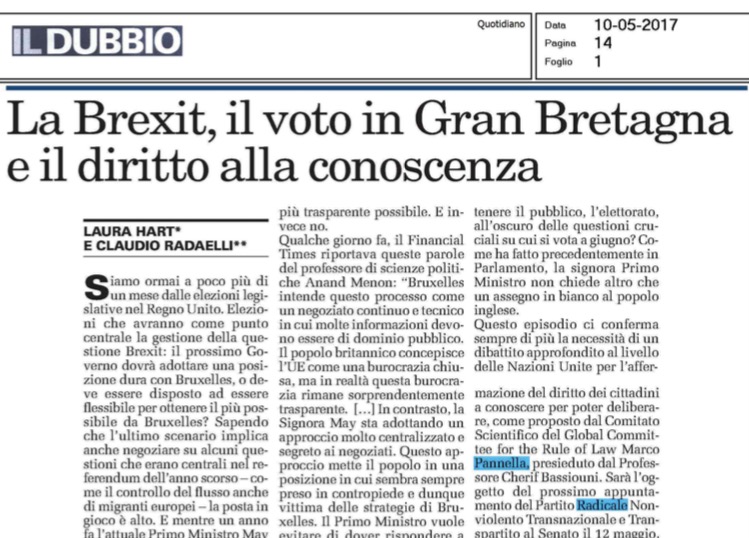Brexit, the vote in Great Britain and the right to know*
The national elections in the UK are already upon us. These elections will be central to handling the issue of Brexit: will the next government take an even harder negotiating posture with Brussels, or will it show flexibility to get the most out of Brussels? The stakes are high: the flexibility scenario also implies negotiating on some issues that were central to last year’s referendum – such as the control of the flow of intra-EU migrants. While a year ago the current Prime Minister was still engage with the Remain camp, today she is increasingly inclined towards the “hard Brexit” position, hoping to ride of anti-European sentiments.
After the UKIP election collapse in the local elections of May the 4th and the triumph of the Conservatives, no one knows whether a likely Conservative landslide in June will bring the Prime Minister to a different position. Some of the observers in these days asked for clarity, recalling the notorious coach with the 35 million pounds back for the National Health Service. In short, everyone in this run-up to June the 8th should make an effort for maximum transparency. But guess what – the opposite is true.
A few days ago, Professor Anand Menon, head of the ESRC programme on the UK in a Changing Europe, said to the Financial Times: “Brussels sees this as a continuous technical negotiation in which a lot of information needs to be put into the public domain. People in Britain regard the EU as a closed bureaucracy but in actual fact it remains remarkably transparent.”
No one is asking to unveil tactical moves and the subtleties of negotiation with the EU. But citizens still have the right to go to the elections knowing the truth about the grand Brexit design and the strategy – both today’s strategy and, more importantly still, the likely strategy of a Tory super-majority led by Theresa May after the June elections. The story does not reassure us: remember the lies surrounding another key decisions, the one on the Iraq war. Today a Prime Minister running for re-election, hoping to increase her majority, believes it is entirely legitimate to keep her citizens in the dark about how her new government will tackle the process of exiting the EU. As she did before in Parliament, Mrs Prime Minister asks for a blank cheque – the opinion polls must have made her confident that she can easily cash the cheque.
This episode is indicative of what the right to know means – and how it is denied, even in a case where the electoral costs for Theresa May would be minimal. We are campaigning for a recognition of this emerging right to know at the United Nations. Together we have gathered a coalition of citizens, politicians, diplomats, movements and university experts in the “Global Committee for the Rule of Law Marco Pannella”. Last week the Committee organized an international conference at the Italian Senate on the right to know and the media – with the participation of Amb. Giulio Terzi di Sant’Agata, former Minister for Foreign Affairs of Italy, Herdis Thorgeirsdottir, Vice-President of the Venice Commission, Matthijs Berman, Main Adviser to the OSCE Representative for the Freedom of Media, Francesco Posteraro, AGCOM Commissioner, Stefano Polli, Vice-director of ANSA, Giuseppe Giulietti, President of FNSI.
London may well be silent today, but at least a clear voice is raised elsewhere: citizens demand the right to know and are prepared to embark on the political voyage for its acknowledgment at the UN.
Laura Harth
UN Representative of the Nonviolent Radical Party Transnational and Transparty
Claudio Radaelli
Professor of Political Sciences at the University of Exeter, Member of the Scientific Committee of the Global Committee for the Rule of Law “Marco Pannella”
*The article appeared in the Italian newspaper Il Dubbio on 10th May 2017

